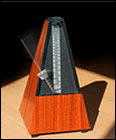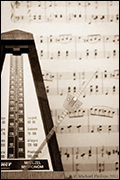
A scenario
Young, keen guitarist gets a guitar. He spends time diligently figuring parts out, learning from recordings and magazines. He starts to feel quietly pleased with his progress and looks for ways to improve further. He hears that it’s a good idea to get a metronome so he keenly buys one and heads home to give it a try.
“Hmm… this isn’t very much fun at all… I know how to play this tune but this damn metronome won’t keep time with me… I think I’ll just turn it off.” And off it stays for a couple of years…
 Sound familiar?
Sound familiar?
It’s something that many guitarists do in the early stages of their playing; as did I. I can remember thinking that my metronome must be faulty. Then, having reluctantly accepted that it wasn’t, deciding that trying to adhere to this electronic click made my playing sound mechanical and ‘unhuman’.
It was a long time before I grudgingly turned it back on again, having accepted that my timing really was in need of some serious work. It’s not a nice realisation, but it is an important one to make and the sooner you make it, the better.
As with many aspects of musicianship, accurate timing is not inborn; it is learned. And using a metronome is the single best way to do it. A metronome is mandatory.
The long road to better timing
Practising to a metronome is a valuable activity throughout your development as a guitarist. In the early days it will develop your sense of time and help you eradicate basic bad habits such as pausing before a chord change.
Later on it will improve your ability to perform subdivisions accurately. Did you come out of that 16th note triplet phrase in time? Without a metronome, how can you be sure?
Aside from developing good time, a metronome is also an essential aid for developing your speed. A metronome, much like an overbearing gym instructor, puts pressure on you to strive for something beyond your current capability. This is how we improve.
Without a metronome we may play an exercise moderately fast, but it will almost certainly be within our current limits.
 All guitarists should use metronomes
All guitarists should use metronomes
Developing good timing is not an elitist activity; it is one of the essential components of good musicianship.
The difference between a band with viciously accurate timing and one with shaky timing is vast. The audience will testify to this too. They may not know explicitly what the difference is, but they know they’re not getting a great performance.
If you’ve never worked with a metronome, get one and start using it. If you’d like a physical metronome, I recommend the Seiko SQ50-V Quartz Metronome. It’s cheap, clear to read and I use one myself.
If you already have a metronome but it’s gathering dust on a shelf, get it down and introduce timing into your practice regime today. Nowadays you don’t even need to buy one, free apps and metronome websites are everywhere, there’s even one on this website: online-metronome.
Music is not just about which notes to play it is equally about when to play them.
If you play all the right notes but you’re not in time … well, then you’re playing all the wrong notes. If you want to fix this, a metronome is mandatory; not optional!
If you liked this article on why guitarists should use metronomes please share it with others.
photo credit: odolphie via photopin cc photo credit: mikeyp2000 via photopin cc
APR
2013

About the Author:
Stuart Bahn is a professional guitarist and guitar educator in London, England.